|
|
|
Sort Order |
|
|
|
Items / Page
|
|
|
|
|
|
|
| Srl | Item |
| 1 |
ID:
185846
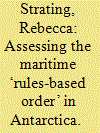

|
|
|
|
|
| Summary/Abstract |
International Relations has become increasingly interested in maritime order as the oceans have emerged as a key site of strategic competition. The South China Sea has become totemic of contests between ‘free’ and ‘closed’ visions of the seas, and is viewed by some as a litmus test for China’s efforts to re-write the ‘rules-based order’ in other maritime domains. This article examines the maritime ‘rules-based order’ in Antarctica, critically examining how and why the United Nations Convention on the Law of the Sea (UNCLOS) matters for the Antarctic region, the Southern Ocean and mechanisms of regional governance. This article contributes to understanding the complexity of maritime order in Antarctica by using Australia’s maritime claims as a case study. Australia is the largest claimant state in Antarctica, with the Australian Antarctic Territory (AAT) constituting 42% of the landmass. This paper examines Australia’s contentious maritime jurisdiction and its ‘normative hedging’ strategy that simultaneously asserts maritime claims and defends collective governance mechanisms, despite the apparent dissonance between these two positions. It argues that the Antarctic region has its own unique ‘rules-based order’ and geographic realities that complicate cross-regional comparisons, and that even so-called ‘like-minded’ states interpret maritime rules in different ways.
|
|
|
|
|
|
|
|
|
|
|
|
|
|
|
|
| 2 |
ID:
172231
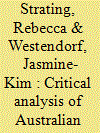

|
|
|
| 3 |
ID:
124874
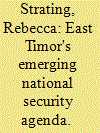

|
|
|
|
|
| Publication |
2013.
|
| Summary/Abstract |
This article focuses on the steps East Timor has taken to bolster its defense sector following its attainment of independence in 2002. In International Relations, scholars have often argued that the ability to defend territory and population from external threat is an essential component of sovereign statehood. Literature on post-colonial sovereignty, however, suggests that the external sovereignty of "weak" post-colonial states is more likely to be protected through international legal recognition. In recent years, East Timor has sought to develop their defense capacities in line with conventional thinking about security and "real" independence. This influences the foreign relations of East Timor and also has broader implications for understanding security and independence in post-colonial states.
|
|
|
|
|
|
|
|
|
|
|
|
|
|
|
|
| 4 |
ID:
172237
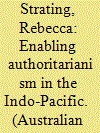

|
|
|
|
|
| Summary/Abstract |
In recent white papers, Australia has identified rising authoritarianism in the region as a key challenge to its regional security interests. Foreign policy discourses highlight Australia’s normative commitment to global democracy, and Australia engages in a range of democratic promotion activities. Democracy promotion by Western states has come under scrutiny by analysts of different ideological persuasions. Critics have framed American ‘exceptionalism’ as really meaning ‘exemptionalism’, referring to its capacities to create exceptions for itself and its own conduct on the global stage, particularly regarding democracy and human rights. This paper argues that this exemptionalism is not limited to the United States: Australia also engages in practices that have undermined its democracy promotion principles. In some cases, Australia’s policies have enabled authoritarianism to flourish unchecked. This paper uses Australia’s refugee policy and its effect on the small Pacific Island state of Nauru as a case study. It highlights how the securitisation of asylum seekers for electoral purposes has contributed to Australia carving out an exception for itself in both adherence to international refugee law and the promotion of democracy. It finds that formal democratic processes within Australia have produced undemocratic outcomes in foreign policy.
|
|
|
|
|
|
|
|
|
|
|
|
|
|
|
|
| 5 |
ID:
134032
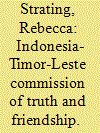

|
|
|
|
|
| Publication |
2014.
|
| Summary/Abstract |
International justice is characterized by the global articulation of basic human rights and peremptory norms outlawing crimes against humanity. In the twenty-first century, an international obligation of states to pursue individuals who bear responsibility for gross violations of human rights has formalized. Since the 1999 independence referendum, Timor-Leste has struggled to achieve substantive justice for the human rights violations committed during Indonesia's 25-year de facto administration. Timor-Leste provides a unique case study on the international dimensions of pursuing justice in a post-conflict transitional context, particularly as many alleged perpetrators of rights violations have been shielded by Indonesia. This presents a challenge for Timor-Leste in balancing its various international and domestic priorities: while domestic political order and rule of law necessitates the pursuit of substantive justice, Timor-Leste's external security interests require a positive relationship with Indonesia. This article examines the world's first bilateral Truth and Reconciliation Commission, the Indonesia-Timor-Leste Commission of Truth and Friendship. It then analyses the implementation of the Commission's recommendations by Indonesia and Timor-Leste. The paper argues that the Commission was primarily a political mechanism designed to support international priorities rather than substantive justice.
|
|
|
|
|
|
|
|
|
|
|
|
|
|
|
|
| 6 |
ID:
186101
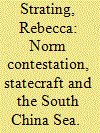

|
|
|
|
|
| Summary/Abstract |
Since 2009, the South China Sea disputes have taken on increasing global significance. Situated within a rapidly transforming political landscape, these sovereignty and maritime disputes are totemic of contests over the regional security order and the institutions, rules and laws that support it. The United States has explicitly called upon ‘like-minded’ allies and partners to defend the so-called ‘rules-based order’ against the revisionism of the rising People’s Republic of China, including in the maritime domain. In particular, the South China Sea has become a highly visible arena of ‘normative contestation’, one that raises questions about how norm-preservationist regional powers enact security practices to uphold their preferred vision of order. This study uses Australia as a regional power case study to assess the interests and approaches of a key US ally to normative contestation in the South China Sea. It addresses two questions: first, how does Australia perceive and articulate its interests in the South China Sea? Second, what security practices - diplomatic, legal and operational – can a regional power such as Australia bring to bear in its statecraft? It argues that as a regional power, Australia has adopted a normative approach to upholding maritime order. While Canberra has ratcheted up the rhetoric on the importance of maintaining the ‘rules-based order’ in response to China’s actions in the South China Sea, its security practices have retained a routine, ‘business-as-usual’ quality. This approach is designed to support maritime rules while avoiding economic retaliation from Beijing, reflecting broader strategic dilemmas as a middle-sized state wedged between two great powers. Unpacking the nuances of Australia’s South China Sea statecraft provides important insights for understanding for the preparedness and limitations of regional powers in defending their preferred conception of maritime order.
|
|
|
|
|
|
|
|
|
|
|
|
|
|
|
|
| 7 |
ID:
192520
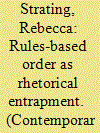

|
|
|
|
|
| Summary/Abstract |
In response to challenges to Asia’s security order, regional powers such Australia, India, and Japan have adopted new “Indo-Pacific” strategic narratives to promote and defend the “rules-based order.” These narratives use China’s maritime disputes with smaller neighbors in the South China Sea as a key example of Beijing’s revisionist intentions. Yet such narratives expose “rules-based order” advocates to risks of “rhetorical entrapment” as other actors compel them to abide by the standards they have set. To what extent have Indo-Pacific powers been forced to follow the rules in their own asymmetrical maritime disputes? This article examines three Indo-Pacific cases: Timor Sea Compulsory Conciliation between Australia and Timor-Leste, the Chagos Island Marine Protected Area Arbitration between the United Kingdom and Mauritius, and the Bay of Bengal Maritime Boundary Arbitration between India and Bangladesh. To varying degrees, this article finds that strategic narratives constrained the policy options of all three Indo-Pacific powers.
|
|
|
|
|
|
|
|
|
|
|
|
|
|
|
|
| 8 |
ID:
153312
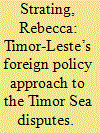

|
|
|
|
|
| Summary/Abstract |
Over recent years, Australia and Timor-Leste’s bilateral relationship has been consumed by contested maritime boundary claims in the resource-rich Timor Sea. Intractable disagreements over the right to build a petroleum export pipeline have led Timor-Leste to reinvigorate its pursuit of permanent maritime boundaries as ‘a national priority’. This article examines Timor-Leste’s interests in the Timor Sea and assesses its strategies for achieving its foreign policy goals. It argues that Timor-Leste’s attainment of its stated goals relies on Australia shifting its Timor Sea policy, which has been largely consistent since the 1970s. Timor-Leste’s key strategy is a public diplomacy campaign that positions permanent maritime boundaries as the final stage of its independence struggle, and presents Timor-Leste as owning the disputed Greater Sunrise gas field under international law. While the public diplomacy campaign aims to win enough Australian ‘hearts and minds’ to put pressure on the Australian government, it ultimately fails to negotiate the strategic and historical realities of the interests that define Australia’s realpolitik approach to the Timor Sea.
|
|
|
|
|
|
|
|
|
|
|
|
|
|
|
|
| 9 |
ID:
172232
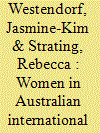

|
|
|
|
|
| Summary/Abstract |
This article reviews the participation of and challenges facing women in international affairs in Australia, with a focus on three sectors: the media, the civil service and the academy. We review the qualitative and quantitative data available, and share the results of a number of surveys and scans we have conducted ourselves: of the gender breakdown of undergraduate enrolments in Australian university courses focusing on international affairs; the gender break down of academic staff employed in politics and international relations programmes at Australian universities; the gender breakdown of authors published in the Australian Journal of International Affairs and the Australian Journal of Politics and History from 2000 to the present; and trends in the gender breakdown of citations in articles published in the Australian Journal of International Affairs between 2000–2001 and 2018–2019. We argue that although women in Australia are interested and engaged in international affairs in almost equal measure to their male counterparts, serious structural challenges continue to undermine their equitable representation in key fora and their career progression. This has clear implications for the future scholarship, practice and analysis of international affairs in Australia and beyond.
|
|
|
|
|
|
|
|
|
|
|
|
|
|
|
|
|
|
|
|
|